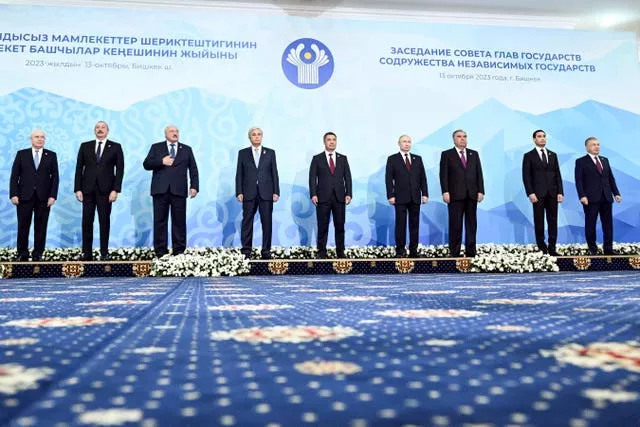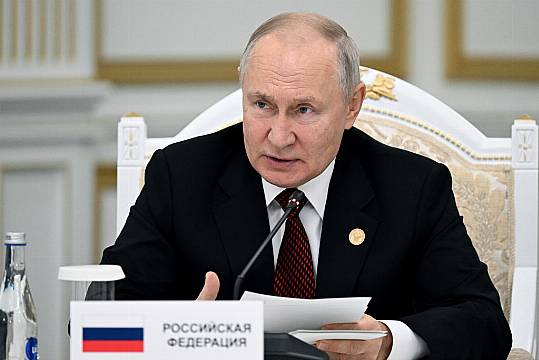Russian President Vladimir Putin attended a summit on Friday of a Moscow-dominated alliance of several ex-Soviet nations and commended the growing co-operation between them despite Western sanctions against Russia.
Mr Putin met in Kyrgyzstan’s capital, Bishkek, with the leaders of most fellow members of the Commonwealth of Independent States.
He told reporters that economic exchanges between Russia and the alliance’s other nations have increased despite Western threats to punish them for maintaining ties with Moscow.
He specifically hailed a new deal on joint air defences with Kyrgyzstan, saying it would help further bolster military ties. Kyrgyzstan, a member of a Moscow-led security pact, already hosts a Russian air base.

At the same time, Mr Putin sought to downplay Armenian Prime Minister Nikol Pashinyan’s failure to attend the summit in Bishkek. He noted that Mr Pashinyan has a lot on his plate after Azerbaijan reclaimed control last month of Nagorno-Karabakh, sparking a mass exodus of the breakaway region’s ethnic Armenian population.
Mr Pashinyan has accused Russian peacekeepers in the region of failing to prevent the hostilities, criticism that added to widening tensions with Moscow.
Russia has also been irked by Armenia’s move to recognise the jurisdiction of the International Criminal Court after it indicted Mr Putin in March for war crimes connected to the deportation of children from Ukraine.
While the indictment would oblige any country that is party to the court to arrest him on their soil, Armenian officials have argued that the move was not aimed against Russia and offered to sign a bilateral agreement that would assuage Moscow’s concern.
In a statement that appeared to indicate a desire to mend fences, Mr Putin said he has Mr Pashinyan’s invitation to visit Armenia and might do so later.

Addressing the participants of the summit in Bishkek, Mr Putin emphasised that “it is important to work together, together with like-minded people from other regions of the world — with the countries of the so-called world majority, the Global South, whose views are very close to us”.
The Russian leader also commented on the Israel-Hamas war. Mr Putin argued that Israel has the right to defend itself after an attack by Hamas that was “unprecedented not only in its scale, but also its cruelty”.
“Israel certainly has the right to ensure its security,” he said.
At the same time, Mr Putin said it was unacceptable for the Israeli military onslaught on Gaza to “make all of its residents suffer, including women and children”.
He stressed that Russia has longtime ties with both Israel and the Palestinians and could help negotiate a settlement.
Asked about unconfirmed allegations that some Western weapons supplied to Ukraine ended up in the hands of Hamas militants, Mr Putin said he would not be surprised if some weapons from Ukraine were sold on the black market but that he did not think it would happen with the knowledge of Ukrainian officials.
“I don’t have any doubt that there have been arms leaks from Ukraine,” Mr Putin said, without providing details. “I certainly have no sympathy for the current leadership of Ukraine, but I doubt that it’s being done on the level of Ukrainian leadership.”







